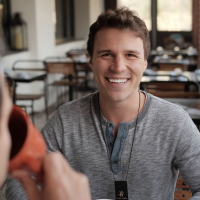I once asked an audience of 500 people to raise their hand if they could state the following:
“Health really works for me. I am grounded in a deep understanding that helps me make great, confident decisions every day.”
Needless to say, no one raised their hand.
This is what I usually hear when it comes to personal health:
“Should I become vegan? Paleo?” Is Kundalini yoga better than Vinyasa? Pilates, perhaps? Does coffee cause cancer, or prevent it?”
“Maybe I should try Crossfit? Why does my juice need to be cold-pressed?”
Confusion, I believe, is the biggest barrier to deep and sustained personal health. When it comes to our health, clarity is a precious commodity and those who have it are the exception, not the rule.
The health world is rife with contradiction and conflict. Give me a medically-backed claim by a credible scientist from a leading university and I’ll show you two from someone equally credible rebuking it.
Years ago this caused me—and apparently 20 million others—to look East seeking answers in yoga, meditation, Ayurveda, and Chinese Medicine. While novel and invigorating, these too have limitations. They are subjective, and imprecise in nature. Every teacher seems to have a different focus making every new class feel like a mental 180. Stepping into this vast, new world can be as confusing as what we sought relief from in the first place.
So—what is health?
This sounds like a dumb question. Of course we know what health is…don’t we?
Are the bodybuilders on TV healthy? What about the ultra-marathon runners? Is perfect health belong to those who live the longest—or is it the people with the most vibrant skin and bright eyes, who seem never to age? Is a cancer patient healthy the day before they received their diagnosis?
Are you healthy right now?
It occurred to me that as a culture, we are fundamentally confused about that word. The medical definition of health is “the state of being free from illness or injury.” I find that pretty absurd. That’s like saying if you lack financial debt, you are rich.
There’s a huge difference between not having a disease and having deep, sustained health. If every doctor in the world told you you were healthy—but inside you felt sick—would you consider yourself healthy?
Disease, we understand impeccably, but as soon as the doctor clears you, there’s very little to guide us toward sustained health. It’s like we’re trying to build a house without a blueprint.
I spent the last two years reading 75 of the best-selling books on health, fitness, nutrition, yoga, meditation, chronic disease, and everything in between. The more I learned, the more confused I became.
It occurred to me that a foundation was missing. Something simple, common-sense and self-evident — meaning you could look around and see it validated everywhere. Complexity and specifics have their place, but only on top of a well-reasoned foundation.
Many have simply resigned themselves to believe that answers don’t exist. Some believe we need expensive technology to figure it out. There are over 800,000 species of animals on the planet, and humans are the only ones confused about their health.
If you look in nature, health is the natural condition. Wild animals generally live in perfect health until the day they die. It’s pretty ridiculous to imagine a herd of wild gazelles sitting around talking about what they should be eating. They know what to do.
We singularly, of all the species, have become so disconnected with basic common sense when it comes to our bodies. Health is obvious. It’s pervasive. It’s happening all around us, we are just looking at it through the wrong lens.
We skipped an important step when integrating Eastern practices into our lives. We fixated on the techniques and ignored the deeper aspects. We still seek answers outside ourselves. It’s the same approach but just with different tools. Instead of taking Tylenol, we take herbal supplements. Instead of going to the gym, we now go to yoga. As a result, not much has changed. We’re still caught in the conditioned cycles of allopathy.
As I looked deeper into the philosophies of yoga, Ayurveda, and Chinese Medicine, I began to see a set of common, cornerstone principles about how to live optimally in the body. You might call them “the fundamentals,” and until now they have gone almost entirely unaddressed by the Western world.
Yoga poses, acupuncture, and meditation are just techniques the ancient masters invented to help lead us to these principles, sort of like training wheels. The principles, not the techniques, are the true source of value.
Far from strict guidelines or dogma, they are general guidelines about how to relate to your body and its environment. Rather than telling you what do to, these principles will help you observe how health works in your own body, so you will have them for life.
I believe these are the master keys to unlocking the deeper dimensions of health. They reveal a new grain of existence as profound as anything you will ever discover. A more refined version, beyond appearance, a grandeur of simply existing.
A world where each breath feels sweeter and colors appear brighter. In this dimension, you wake up every day with energy and inspiration—a freedom and lightness in your body.
Slowly,you start to expect,no demand this feeling all the time. It becomes normal. The feeling is painted on everything you see, think and feel. It changes how you relate to the world around you. It is this sense that guides you so you can live forever with the highest expectations of life.
To know true health is a gift—the best gift you will ever receive—and no one can take it away from you.
I will state each principle here, and will expand on them in my upcoming book “The Health Manifesto.”
These principles have changed my life. They’ve empowered me to see health through my own eyes, and have finally made health become common sense.
I’m confident they will do the same for you.
The 5 Principles of Health
1. Principle of Original Nature:
The principle of original nature states that health is our natural condition, that health is a process of removal and purification rather than adding and enhancing. It states that health is nature, that our highest form of well-being is not technologically-enhanced, but one aligned with the natural order of the universe.
2. Principle of Balance:
The principle of balance states that something is healthy to the extent that it brings a person back into balance. It also states that the potential for balance is limitless, that balance can always be more refined.
3. Principle of Reflection:
The principle of reflection states that everything we think, feel and experience manifests somewhere in our bodies. Every event, every relationship, every thought, and every food has a corresponding physical pattern.
4. Principle of Change:
The principle of change states that health is a present condition, that it is always changing, and that any static definition of it is incomplete.
5. Principle of Contribution:
The principle of contribution states that a person cannot exist in health if they are not in harmony with, and actively contributing to their environment. Health is not only measured by wellbeing brought to the individual, but how much is spread to the community as a whole through his or her existence.
Remember—their true value lies not in understanding but in application.












Read 0 comments and reply